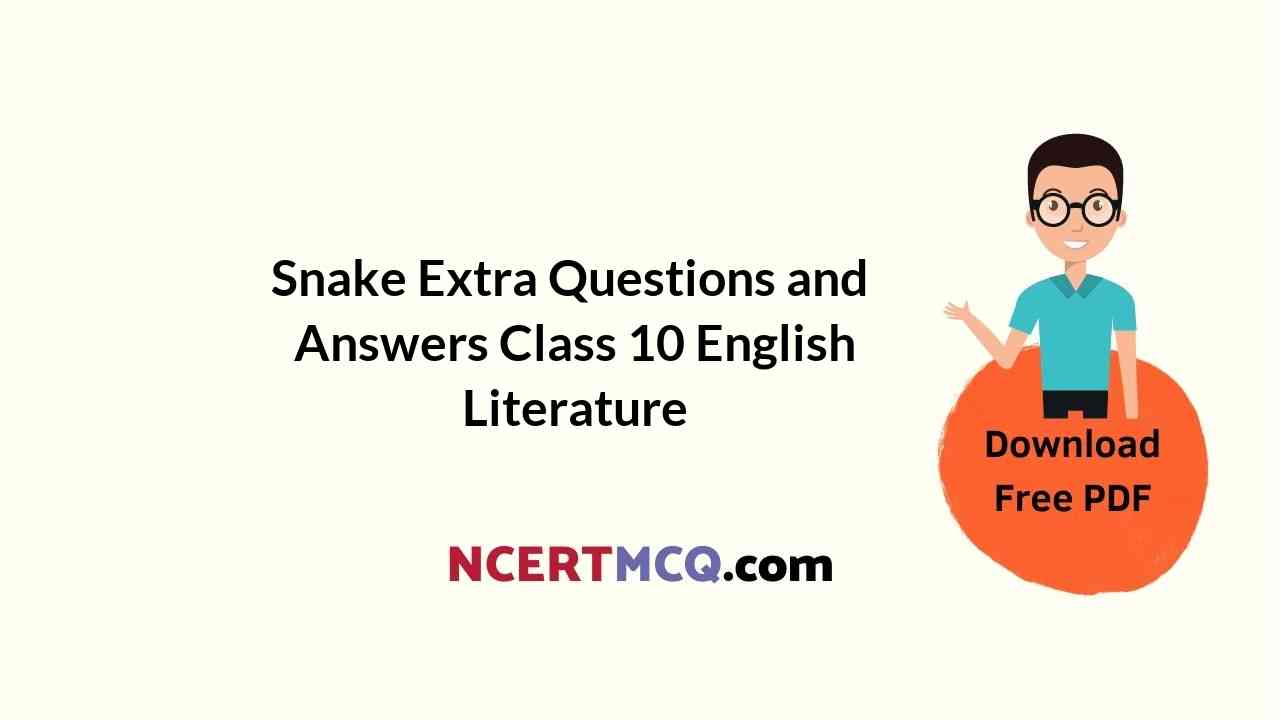Here we are providing Three Men in a Boat Extra Questions and Answers for Class 9 English, Extra Questions for Class 9 English was designed by subject expert teachers.
Three Men in a Boat Extra Questions and Answers for Class 9 English
Three Men In A Boat Question Answer Question 1.
Name the four characters introduced in this chapter. Give an account of each.
Answer:
The four characters introduced in this chapter are the two friends of the narrator, George and William Samuel Harris, the narrator and his dog, Montmorency. J. is one of the main characters in the book and he is also the narrator of this story. J. sees himself as hardworking, intelligent and competent when in fact in real life he was the exact opposite. He is also a hypochondriac much like his other friends.
George is a very good-natured person. He works at the bank and is seen to be more grounded than his other two friends. He brings a banjo to his house and starts to learning how to play. Harris or William Samuel Harris and J. have known each other for a long time. He is bigger in build and used that to scare away somebody who was trying to blackmail them.
Three Men In A Boat Questions Question 2.
What were the men discussing and why were they doing so? Did they come up with a solution and what did they decide to about it?
Answer:
The men were discussing their poor health and their symptoms because they were experiencing spells of giddiness. The narrator was convinced that his liver was not functioning properly. They diagnosed themselves with every kind of disease they could find and only eliminated a disease called housemaid’s disease. They later identified the source of their poor health and hypochondria could be a result of stress and overwork so they decided to take a holiday. Then they finally decided to row up the Thames.
Three Men In A Boat Questions And Answers Question 3.
Why did the narrator suspect that his liver was not well? What made the narrator feel that he was an interesting medical case? Do you think something was wrong with him? Give reasons for your answer.
Answer:
The narrator felt so because he had been reading a circular that contained symptoms of liver disorder and he was convinced that he had all the symptoms.The fact that the narrator felt that he had every disease listed in the medical book he had ever read in the reading room convinced him that medical students could learn a lot about the various diseases by just studying him.There was nothing wrong with him, he was perfectly normal. The narrator seemed to worry about having a serious illness which turned out to be a phobia.
Three Men In A Boat Answers Question 4.
What does the narrator mean when he makes the following statement: “I had walked into that reading-room a happy, healthy man. I crawled out a decrepit wreck.”
(Encourage the students to think creatively andformulate their own answers.)
Answer:
The narrator means that though he had been quite hale and hearty before going to the reading-room, after reading the symptoms listed in the medical book, he felt that he was actually a very sick man as he seemed to have all the symptoms of most of the diseases listed in the book.
Three Men In A Boat Mcq Questions And Answers Question 5.
Why did the chemist not give the narrator any medicine when he gave him the doctor’s prescription? What did this mean? Do you think the doctor knew what the narrator was going through? Give ‘ reasons for your answer.
Answer:
The chemist did not give the narrator any medicines because the prescription did not contain th6 names of any medicines. All it had written on it was the name of the food and drink and the exercise that the doctor felt the narrator should have. It also contained the time at which the doctor advised him to sleep. This meant that the doctor did not think anything was wrong with the narrator.
Yes, I think the doctor knew exactly what was going on with the narrator because instead of prescribing medicines-and drugs, he had prescribed food and drinks as well as exercise. This shows that the narrator was healthy and had no tangible physical pain. It was ali a part of his phobia.
Question 6.
How has the narrator dealt with illness in his childhood whenever he complained it? Do you think that is the right approach? Give reasons for your answer.
Answer:
The narrator would be boxed or slapped hard on the side of his head and this strangely used to cure him of his illness at that time. (Encourage students to think creatively and formulate their own answers.) Despite the proverb, ‘spare the rod and spoil the child’, physical abuse in any form is not healthy and this form of negative reinforcement gives trauma to the recipient of the act.
The narrator is suffering from Hypochondria which is a phobia in itself and the cure itself lay in the parental figures understanding their child’s status. No, I do not think that violence or abuse is not cure for any illness. The parents must’ve figured that the child was acting but in fact the.problem lay in his psyche which by negative reinforcement was only able to suppress.
Question 7.
What does the narrator find strange about people talking about their sea trips? Why did George suggest that they could go on a boating trip?
Answer:
The narrator was surprised at the fact that they never discussed their bouts of sea-sickness. They often recounted tales about other people’s sea-sickness but never their own. They probably felt that it was a sign of weakness and the listeners might make fun of them. According to George, a boating trip on a river would give them fresh air, exercise and peace that they wanted. The change of scene would occupy their minds and the exercise of rowing the boat would give them a good appetite and tire them enough to get a good sleep.
Question 8.
Why was Montmorency not too keen to go on the boat? Is it right to fear the ocean and the boat?
Answer:
Montmorency, the dog, was not keen to go on the boat ride because he was not looking forward to being confined in the boat for hours together without any exercise, neither could he go chasing rats. He was also apprehensive that the men might not be able to handle the boat carefully and so there were chances of then- falling overboard into the river.
(Encourage the students to think creatively andformulate their own answers.)
Yes, I think it is right to fear the ocean because the seas and the oceans are a dangerous place with many unknown perils and subject to the erratic weather conditions. One can be afraid of the boat because the food supplies as well as other essentials could end any day on the boat and they would not have either land or another ship to possibly restock supplies.
Question 9.
What plans did the three men make about their trip? When were they planning on going on their trip and what was the major point of discussion while planning the trip? What was their final decision?
Answer:
The three men planned to leave on their trip on the following Saturday. Two of them, i.e., the narrator and Harris, would take the boat from Kingston to Chertsey, while George who worked in a bank would meet them at Chertsey the same afternoon. They had also taken great pains to pack their things but later on realized only to pack the essential things.The major point of discussion amongst the three was whether they would be camping out or sleeping in the inns. Finally, they decided that on fine nights they would sleep in the tents but on rainy nights they would sleep at the inns.
Question 10.
What are the difficulties described by the narrator about camping out in the open when it was raining? Do you think it would have been an adventure without the rain? Give reasons for ‘your answer.
Answer:
According to the narrator, the boat gets filled with water which makes it is very difficult to put up the tent. Also, making wood fire becomes impossible, the food supplies get soaked in the rain and turn . liquid. Moreover, tobacco becomes damp and the only thing that gives some comfort is a bottle of liquor. Additionally, one is down with a cold in the morning.
(Encourage the students to think creatively andformulate their own answer.)
No, I do not think it would have been an adventure without certain hardships such as the rains. It is only in difficult situations that one is confronted with the idea of happiness and for the three men who took a vacation to find happiness and freedom, the rains somehow reminds them of the fact that happiness is not by doing things or by being with certain people but it’s about appreciating one’s current situation and surroundings.
Question 11.
How does Uncle Podger involve the whole family in the simple task of hanging a picture? Why do you think J. keeps comparing Harris to Uncle Podger?
Answer:
One of the girls from Uncle Podger’s family was sent to buy nails, a boy was sent to tell the girl what size of nails to buy, a boy called Will was asked to get a hammer while Tom got him a ruler, the step-ladder and the ‘ kitchen-chair. Jim was sent to Mr Goggle’s house to lend him his spirit-level. Maria had to hold the light so that he could see clearly.
The girl, who had gone to get some picture-cord, and Tom were called back to hand him the picture. Then he dropped the picture, broke the glass, lost the nail, then the hammer and every time the whole household had to rally around trying to help him. J. keeps comparing Harris to his late Uncle Podger because much like Uncle Podger, Harris also cannot perform basic tasks without making mistakes and ends up riling everyone around him.
Question 12.
What is the narrator’s advice for those who load their boat with useless things? Why? What items did the three finally decide to carry on the trip?
Answer:
According to the narrator, one should discard everything that is unnecessary because it only creates danger and causes unnecessary confusion and clutter. The narrator goes on to compare this with life in general where people seemed to do the same with thoughts and emotions, holding on to them unnecessarily and creating tension for themselves. This could not give anyone a respite from anxiety and care, and one cannot enjoy watching the beauties of the world one lives in.
The three finally decided to carry only the things that they could not do without, such as, a rug each, a lamp, some soap, a brush and comb, a toothbrush (each), a basin, some tooth-powder, some shaving tackle, and a couple of big-towels for bathing along with food provisions. They also decided to take a change of under clothes and plenty of socks, in case anyone wanted a change; also plenty of handkerchiefs and a pair of leather boots, as well as their boating shoes.
Question 13.
Do you think George and Harris were experts at packing and how did Montmorency help in the packing? Give reasons for your answer.
Answer:
No, George and Harris do not seem to have been experts, because they started by breaking a cup, and continued by squashing a tomato under the bottle of jam. They packed the pies at the bottom and thus squashed them, spilt salt over everything and as for the butter, they stepped on it, sat on it and put it all over themselves and the room.
Montmorency made a complete nuisance of himself. He sat down on things which had to be packed, pushed his nose into Harris or George’s hand whenever they reached out for anything, put his leg into the jam, played with a teaspoon and pretended the lemons were rats. He chased the lemons inside the hamper till he “killed” three of them, before he was hit by Harris with a frying pan.
Question 14.
Who was Biggs? Who were his boys? Why did the narrator get irritated with Biggs’ latest boy? Who were the other people who stopped by to watch the narrator and Harris as they waited for their cab? Why did they do so?
Answer:
Biggs was the narrator’s greengrocer. His “boys” were the errand boys who he hired to help him with his ‘work. The narrator was irritated with Biggs’ latest boy, as instead of going about his work, he stopped to stare at the narrator and Harris, who were waiting for a taxi with all the luggage that they had packed for their boating holiday.
Apart from Biggs’ boy, the grocer’s boy, the gentlemen from the boot shop and the superintendent from the Blue Posts, all stopped by to watch the narrator and his friend. Soon, there was a crowd of people who stopped by. They were curious to know where the narrator and his friend were off to with such a lot of luggage. In fact, one group thought it was a wedding party, with Harris being the bridegroom, while another group thought they were off to the narrator’s brother’s funeral.
Question 15.
What examples does the narrator cite to prove his viewpoint that each person has what he doesn’t want and wants what he doesn’t have? Do you agree with the saying? Give reasons.
Answer:
He mentions the fact that married men have wives they do not seem to want, while single men are not able to get wives at all. Similarly, he mentions poor people were hardly able to take care of their families having eight children and more, but rich old couples had no one to leave their money to. Encourage students to think creatively and formulate their own answers.
Yes, I agree with the statement. This saying is similar to the proverb the grass is always greener on the other side, where when we look at our lot and look at others, we are more envious of them. But if we were to take the viewpoint of each person, one has what he doesn’t want and wants what he doesn’t have, would be incorrect because there are instances where people search for what they want and obtain it. The saying is a typical depiction of needs versus wants.
Question 16.
According to the narrator, why did people leave the countryside and flock to cities and towns? Do you think this movement of people reveal the state of society at that time and why does the three men do the exact opposite? What does the author try to relay in the story?
Answer:
According to the narrator, people flocked to live in cities and towns, because the nights in the countryside could be very lonely, quiet and frightening, with lamps casting ghostly shadows all around. It is the longing for human voices and the throb of life and the gas-lit streets that attracted people to the cities.
(Encourage students to think creatively andformulate their own answers.)
This movement of people might have several reasons, but the answer that the reason that the narrator gives might not entirely be true. The city was seen as a place of opportunities for work, fame and other things, in the cities all modem facilities were available and it was not because of the call of the gas-lit streets. This movement of people could be because of the growing economy where the late 19th century can be seen as the height of industrialization.
The three men do the exact opposite because they are tired of city life and thought that the quiet solitude of the country life as well as the fresh air would do them good. The author makes us understand that the country life is not as idyllic asThe three men made it sound like. Much like the city, country life also had its own share of problems.
Question 17.
In what context does the narrator comment that a boating costume “ought to be a costume that can be worn in a boat, and not merely under a glass-case.” What was his experience of the boating trip with the two ladies?
Answer:
The narrator makes this remark while referring to two ladies who had once gone on a boating picnic with him. They were dressed beautifully, but inappropriately in lace and silk, which could get damaged by even a drop of water falling on it. The narrator was unnerved by trying to prevent any drops of water touch them, and asked his friend to row instead.
However, the friend rowed so carelessly that the girls were covered with water and were upset as a consequence. They had an even worse time at the picnic. The girls completely spoilt the party for themselves, and for their companions, by their wrong choice of clothes.
Question 18.
“I was going on thinking away all these grand, tender thoughts, when my reverie was broken.” What were the grand thoughts that the narrator was thinking? What is a reverie and how was the narrator’s broken?
Answer:
The grand thoughts were the narrator’s musings on a sunny morning when he had visited a little village church. He had felt so much at peace, that he had forgiven all his relatives and friends for all the times they had hurt him. His thoughts were full of forgiveness and blessings. A reverie is a daydream, and the narrator’s was broken by the shrill voice of an old bald- headed man coming towards him with a large bunch of keys, offering to show him some tombs.
Question 19.
What happened when J. and Harris parked their boat near Kempton Park? How did the narrator react to the gentleman’s attempt at blackmail? What chain of thought ensued after this incident?
Answer:
The narrator and Harris stopped for lunch and parked their boat near Kempton Park. They were interrupted by a man who claimed that they were trespassing. The man claimed that he had come to warn them that they were trespassing, but actually, he wanted to make some money by threatening to tell the owner of the property about them. Both the narrator and Harris refused to be scared by the man’s threat.
When the man said it was his duty to keep trespassers away, Harris invited him go ahead and do his job. The man looked at Harris’ well- built body and backed down, saying he would return with the owner. However, he never returned. The narrator and William Harris started discussing about the stupidity of such a prohibition that stops visitors and the ruins.
Question 20.
What is the narrator’s view about tow lines? Why does the man with the tow line get angry with the tourists from stopping on the banks. It seemed to Harris that such an act was punishable and the landowners and his family who were against trespassing of this sort should have violence inflicted on them and that the noticeboard should be buried along with their tombstones while he sings comic songs on man who had handed it to him, and vice versa? How was this muddle resolved?
Answer:
The narrator believes that tow lines are strange objects which get tangled no matter what you do. He believes that even though one might take considerable pains to wind and coil the tow line neatly, it gets tangled within minutes.According to the narrator, the man with the tow line finds the tow line in such a tangle that it takes all his skill to untangle it. He thinks it is the fault of the man, who wound it in the first place, for not doing a neat job.
On the other hand, the man in the boat, having just handed over a perfectly coiled line, blames the man on the bank for being careless and tangling it all up. In the end, they get so angry that they just want to use the tow line as rope to hang each other.The muddle was finally resolved when the men came out of the boat and managed to detangle the tow line. At first they found themselves tugging at the same part of rope from opposite ends, but finally they managed to clear it, often finding that the boat had drifted off in the meantime.
Question 21.
How did George and his friends take advantage of the man and the girl who were pulling along a tow line? Why did the narrator think it was exciting to be towed by girls?
Answer:
Since the girl and the man did not realize that they were towing ah empty line without any boat, George managed to hitch their boat to the tow line. Thus, the boy and girl now towed the boat up to Marlow before realizing what had happened. According to the narrator, it is a sensation that should not be missed. Generally it takes three girls to tow a boat—two to pull and one to run around giggling.
They begin by getting themselves tied up in the rope. Once they undo it from around their ankles and necks, they start off at a run, pulling the boat at a dangerous pace. At the end of a hundred yards, they are breathless and stop suddenly, causing the boat to drift midstream and turn around. They often have to be reminded to keep the boat moving. They also have to keep coming back to the boat to comb their hair or get a shawl. When they finally get going again, they are likely to be scared by a cow in their path. Thus, there is never a dull moment.
Question 22.
Do you think George was a committed worker in the bank? Give reasons for your answer. What does this show about his character? (Encourage students to think creatively and formulate their own answers.)
Answer:
No, George appeared to be doing very little work at the bank from the description of the manner in which he was found sleeping most of the time. He, himself, admits that the bank officers working with him would probably have to awaken him and send him on the trip. George seems to be very lazy and laid back in his attitude and is content to let other’s do his work.
Question 23.
What does the narrator want to suggest through the following statement “If Harris’s eyes filled with tears, you can bet it is because Harris has been eating raw onions.” What does this tell about their characters?
Answer:
The narrator wants to point to the fact that Harris was a practical man unlike himself who had a romantic viewpoint about most things in life. He makes this remark when Harris cuts short the narrator’s romantic description of camping out in a tent in the lap of nature by asking him what they would do if it started raining while they were camping out. The narrator was offended by this interruption and pointed out that Harris had no romance in his soul unlike the narrator, because he, like a pessimist, could only think of problems such as rain instead of visualizing the beauty of nature.
Question 24.
Can you give a description of one of the themes that run in the novel?
Answer:
One of the central theme that runs across the novel is the theme of city and country life. The author describes city life and says that there is a lot of transition and migration of people from the countryside to the cities because the countryside is lonely. He goes on saying that the gas-lit streets are more preferable.
There is a glorification of city life of the late 19th century but at the same time we see the three main protagonists who are suffering from hypochondria try to escape the busy schedule of their city life. They conjectured that a vacation time in the countryside would ease their phobias and help them recover.
They decide to take a river trip and escape to the calmness of nature. The men do enjoy many calm moments and they are wracked less with their hypochondria but they also realize that the country life is not as idyllic as they thought it would be. The author tries to portray the relationship between city life and country life and makes us understand that true calm and peace is not found in things or people but an acceptance and appreciation of the surroundings no matter the situation.
Question 25.
What does the narrator imply by saying that for five and thirty minutes one could hear only the clank of cutlery and crockery? What does this show about the stomach? Explain how the narrator expresses the superiority of the stomach over the mind? Do you agree?
Answer:
The narrator wants to say that for thirty-five minutes the three men and their dog were all engrossed in eating their food. It shows how hungry they were at the end of the day’s journey.
The narrator establishes that the mind is not as powerful as the stomach, by saying that if one has an empty stomach, he is not able to do any work, including thinking. According to him, if our stomachs are not full and satisfied, we cannot indulge in any work or activity, or achieve the higher goals of virtue and contentment. This shows that the stomach rules our mental as well physical faculties and it is hunger that is a strong feeling that overcomes everything else.
(Encourage the students to think creatively and formulate their own answers.)
No, I do not agree with what the narrator tells us because even though hunger determines our moods and emotions, It is also our will that dictates our state of being. For example, we see various different people go on hunger strikes when standing up for their beliefs and convictions. This shows that hunger does cause great discomfort but we can still subdue it with the help of our mind.
Question 26.
Throughout the novel, we can see that the author keeps on digressing. What do you think could be the reason for his digressions?
Encourage the students to think creatively and formulate their own answers.
Answer:
The novel itself is a straightforward journey that takes the three men from London to Oxford on a boat, what the author does is that by adding digression, he has managed to change the straightforward story into a more elaborate one where the same digressions feed into the story and helps us understand the characters as well as their situations better. This narrative style gives the author the artistic license to add some comic relief to the novel and addresses various issues during late 19th century England in a comical way.
There are frequent flashbacks that describe the characters for us in a more in-depth manner. These digressions seem to bring to our attention that no journey, be it our life or any adventure, is ever straightforward. There are always digressions and changes throughout the way. This particular style is an attempt by the author to depict and relay the message of human nature and the constant search for happiness and contentment through a number of approaches.
Question 27.
What are some of the changes that the new Victorian England brought in? Do you think it offered opportunities for fun and leisure? Give reasons for your answer.
Encourage the students to think creatively and formulate their own answers.
Answer:
Victorian England refers to the time of Queen Victoria’s reign from 1837 to 1901. This period saw many new changes, one was the significance given to gothic architecture, then there was the significance given to the arts and theatre. Technology was making a big headway and it is at this time that the English working and middle class started enjoying public holidays and vacations.
The arrival of steam engine in the form of trains and steamships improved transportation and slowly popularized recreational travel. The countryside and the beach attracted the city residents and there was a lot of movement. Indeed the Victorian Era did offer many opportunities for fun and leisure. Even in the novel, the three men were tired, disillusioned and wanted to take a vacation and decided to opt for an idyllic boat trip to the countryside.
Question 28
Do you think that the Three Men in a Boat has humour in it? What kind of humour or what style of humour do you think the author uses? Why do you think does the author use these styles?
Encourage the students to think creatively and formulate their own answers.
Answer:
Yes, the novel Three Men in a Boat indeed has humour in it. The author Jerome K. Jerome uses a gamut of styles. There is slapstick, social satire and black comedy in it. This novel seems to appeal to a large demographic as its humour caters to many age groups because of its variety. With the help of this variety, the author is able to express his views in different forms and this literary style helps him when he is trying to digress from the main narrative plot. The satire and irony in the novel is actually the main focus of the book and using J. as a protagonist, the author Jerome manages to tie the whole story together and create comical characters making them portray people from different social classes. The author doesn’t seem to overly criticize the English class system.
Question 29.
What was the Magna Carta? Can you give a brief description of its history? By recounting the tale of Oliver Cromwell and King John, what is the narrator trying to say?
Answer:
Magna Carta or the great charter was an agreement signed between the unpopular King John of England and the rebel barons. It was drafted by the archbishop and the island has been long thought of as the place where the agreement took place. It established for the first time that everybody including the King was subject to the law.
By recounting the tale of Oliver Cromwell and King John, the narrator is trying to say that the English countryside they were boating along had not really changed much since the times of Oliver Cromwell and King John. He wants to convey the fact that one could actually imagine all the historical events that had taken place in that area in the past.
Question 30.
The narrator and Harris refuse to enter the two inns at Datchet on some flimsy grounds. What were the excuses they make? What is the irony they have to face at the end?
Answer:
The narrator refuses to enter the first inn because it did not have any honeysuckle flowers growing in or around it. Harris refuses to enter the other inn because he does not like the look of a man leaning against its front door and finds his boots very ugly. The irony is that after they reject the two inns, they come to know that Datchet has only the two inns and when they try to get rooms in the very same inns, they find that they are overflowing with people and are not even allowed to enter inside them.
Question 31.
Why does Harris express a desire to die? What effect does the appearance of the young boy have on him?
Answer:
After the inns refuse to give them any rooms, they go from house to house trying to get a room for the night but are unsuccessful. At this point of time Harris is so exhausted that he wishes he could die. On hearing this, a boy offers them a room for the night in his house. Harris is so overjoyed that he faints and when he is revived, he empties half a can of beer that the boy was carrying and runs towards the’boy’s house much ahead of the others.
Question 32.
How did the men try to open the can of pineapple? Were they successful in their attempts? Give reasons for your answer.
Answer:
As the men realised that they did not have tin can openers, they unsuccessfully tried opening it with several different objects. Harris was the first to try opening it with a pocket knife which broke and injured his hand badly. The next to try was George who used a pair of scissors which just missed hurting his eyes. The narrator tried opening it with the spiky end of a hitcher but it slipped and jerked him out between the boat and the bank into two feet of muddy water.
Finally, the three took the can out on to the bank, Harris held a sharp end of the stone on its lid, George held on to the can while the narrator picked up the mast and brought it down with all his might onto the stone and missed. He narrowly missed hitting George on his head. They finally abandoned their attempts at opening the can and threw it into the river out of frustration.
Question 33.
Do you think the novel Three Men in a Boat is an autobiography? What do you think are its influences?
Encourage the students to think creatively and formulate their own answers.
Answer:
I think that the novel Three Men in a Boat is not an exact an autobiography but there are instances that have been inspired by his honeymoon with his first wife. They had followed the same route as J. and his fellow companions. Apart from the similarity in the journey that was made, most of the influences are from Jerome’s life. The name J. seems to be a short name for Jerome. Jerome belonged to a lower middle class family and had gone through various hardships especially financially. Thus, he had a good understanding of social classes and he had an astute as well as unique take on society, its pretension and hypocrisy.
Question 34.
What is the narrator referring to when he says-“Strange that Nature’s voices all around them…. should not have taught them a truer meaning of life than this.”?
Answer:
He is referring to the Cistercian monks who had once lived in the abbey in the 13th century. They had lived a very hard life wearing rough tunics, eating vegetarian food and spending their time in hard labour, reading and praying. Most of their time was spent in silent contemplation. The narrator is struck by the irony that these monks were living in the lap of Nature at its best, but were unable to appreciate the beauty that God had provided all around them. They lived grim lives waiting in silence for God’s voice from heaven but were deaf to the sounds of Nature that spoke to them all the time.
Question 35.
What was the outcome of Montmorency’s chasing a large tomcat? How did it affect Montmorency? What is Montgomery’s significance in the novel?
Answer:
Montmorency’s chase had the strangest of outcomes. Instead of running away, or showing any signs of fear, the cat calmly turned around to face Montmorency as if to ask him what he wanted. Montmorency, unused to such a reaction, quietly slinked away with his tail between his legs and would thereafter visibly shrink and have a pained expression on his face at the mention of the word “cat”.
Montmorency features prominently in the novel and somehow provides opportunities for slapstick humour. He also seems to function as a foil to the three men, J., George and William Harris. Unlike the three men, Montmorency is always lively and manages to obtain his own food and most of the time is able to defend himself, which was not the case when Montmorency met the tomcat.
Question 36.
What does the narrator want to express when he says that-“our departure from Marlowe I regard as one of our great successes.”?
Answer:
At Marlowe, the narrator and his friends visited a number of shops to buy different kinds of food materials to last them the next three days on the river. At every shop, they waited till the food was packed in a basket and a boy from the shop carrying the basket followed them to their boat. As a result they had a number of boys following them with baskets in a solemn procession through the centre of the street down to the river, making a very impressive spectacle.
Question 37.
Do you think the narrator hated steam launches? Why? How did the narrator and his friends irritate* the men in the steam launch?
Answer:
Yes, the narrator hated steam launches because, according to him, a person who drives them has hardly anything to do apart from smoking a cigar and blowing the whistle at other boats to clear their path. The narrator was irritated by the superior attitude shown by the people who drove them. The narrator and his friends irritated the men in the steam launch by generally pretending not to hear the whistle of the launch and allowed their boat to drift right into the path of the steam launch. They sat with their backs to them and pretended to be deeply engrossed in a story being told by Harris.
As a result, the launch coming at high speed would run aground in trying to prevent the launch from ramming into their boat. The people from these launches would be found shouting at the men but the narrator and his friends would pretend to be oblivious to all their shouting. Sometimes the men from these launches would come and help to remove their boat from their path and all the time the three friends would pretend to be unaware of all the commotion that they had caused.
Question 38.
What was the shock that George and the narrator received while all three of them were having lunch one day? What had happened?
Answer:
The shock occurred when the trio had just about settled to eat lunch and Harris was carving a pie kept between his knees when he asked the other two for a spoon. Both the narrator and George turned around to get a spoon from the hamper and in the short time that took them to get the spoon Harris just disappeared into ‘ the air along with the pie.
What had happened was that Harris had been sitting on the edge of a small gully which was hidden from view by some long grass and when he had leaned back a little, he had fallen backwards into the gully along with the pie.
Question 39.
What do you think of Montmorency? Why did he come to the narrator with a dead rat? Give an example of how he provides comic relief in the story. Encourage students to think creatively and formulate their own answers.
Answer:
Montmorency was lively, belligerent and seemed to enjoy hunting. When Montmorency saw everyone contributing all kinds of food items for the stew he felt that he too had to give in his contribution which in his case was a dead rat. Montmorency seems to bring comic relief to the story with his funny mishaps. He was also known to have a developed awe, suspicion and hate for the kettle.
He would often watch the kettle as it boiled. Whenever the kettle would start to splutter and steam, he would want to fight it but someone or the other would bear it off before he could do so. Finally, one day, he moved towards the boiling kettle and caught it by the spout and obviously, got burnt. The next moment he was seen running around the island and stopping every now and then to bury his nose in the cool mud.
Question 40.
Why was George contemplating assaulting a policeman? Do you think it was a good idea or was the idea made out of desperation?
Answer:
George and the other two men could not find their boat because they forgot where they moored the boat and now in the dark it was even more difficult to locate it. Since it was raining very heavily with the inns overflowing with people, George felt that by assaulting a policeman, they would at least get a place to sleep in the lock-up in the police station. The only drawback to that plan was that the policeman just might hit them back without locking them up. It was certainly not a good idea because it was thought out of desperation. George was not looking forward to getting drenched in the rain and really wanted some shelter even if the shelter came in the form of a prison.
Question 41
Describe George’s first boating experience?
Answer:
George had started boating at the age of sixteen. He joined eight other gentlemen like himself on their boating expedition. They hired a racing boat, but he had confused recollections of the trip, as he was hit on ’ the head by one of the others’ oars. Another one of their number was similarly situated at the bottom of the boat with his legs up in the air. Only one of the enthusiasts actually knew how to row. When George tried to help him, he lost his oar. They finally passed under Kew Bridge, with all the bystanders enjoying the sight, and were convinced that boating was not the thing for them.
Question 42.
The narrator comments that their towing by the steam launch would have been delightful if it had not been for the wretched small boats. What is ironic about the statement? what does this show-about the narrator?
Answer:
His words are ironic, since earlier he had deliberately blocked the path of steam launches, behaving exactly like the small boats he now thought were such a nuisance. However, now that they were doing what he had done earlier, he was finding fault with them.
Encourage students to think creatively and formulate their own answer.
This shows’us that the narrator was being hypocritical. Throughout the novel we see that the narrator digresses from the narrative to make remarks on people, he is seen getting angry at his friends George and Harris for being lazy when in fact he himself avoids doing chores.
Question 43.
What shocked George that morning? Can you describe in detail the events of what transpired?
Answer:
George noticed something black floating in the river and as the boat drew closer, he laid hold of it. He was shocked to realize that it was the dead body of a woman. The woman had committed suicide by jumping into the river. The three friends later found out her story. She had been deceived by someone she had loved, leaving her alone with a child. Her family and friends had abandoned her and she had to work hard for a living and to care for the baby. Finally, she became so depressed that she decided to end her life.
Question 44.
According to the narrator, what are the ways in which people lie about their fishing? What was strange about the trout mounted in the glass case?
Answer:
According to the narrator, people who fish always exaggerate the size and number of fish they have caught. Also, if they find a stranger, they will claim to have caught any large fish that happen to be seen.The trout mounted in the glass case seemed to be a large and impressive, causing George and the narrator to view it with admiration.
Seeing that they were strangers, no less than five different people, including the innkeeper, pretended to have caught the fish. However, when George tried to get a closer look, he slipped and caused the glass case to fall, shattering the trout into a thousand pieces. It now turned out that the trout was not real at all, having been made of plaster-of-Paris.
Question 45.
Why did the narrator feel that the boat named the Pride of the Thames was a Roman relic? What changes did he make to try and make it more presentable?
Answer:
The narrator felt that the Pride of the Thames was a Roman relic because the boat was a basic wooden structure which looked as if it had been dug out carelessly and had been damaged in the process. He fastened the so-called boat together with string and pasted some wallpaper over the shabbier parts to make it more presentable. Before stepping into it, he also thought it best to say his prayers.
Question 46.
Pick out the simile used by the narrator to describe the close connection between sunlight and nature? Why does he say this?
Answer:
According to the narrator, sunlight is like the blood that gives life to nature. Without light nature looks like a widow who has lost her beloved husband, while her children look into her eyes but receive no warmth or comfort from her. He made these comparisons because it was a wet and gloomy day, making nature seem very different from the radiant beauty they had seen on their way up-stream.
Question 47
“You cannot give me too much work; to accumulate work has almost become a passion with me:” Who says these lines? What do they tell about the speaker’s character?
Answer:
The narrator of the novel says these lines. He himself proclaims that he did not like to work at all. He goes on to say, “I had the general symptoms, the chief among them being a disinclination to work of any kind.” This tells us that he was lazy and a laid-back person, who only worked when there was no other option left.
This character of his became more evident during his boat trip when he expects the other two, Harris and George, to be lively and instead it turns out that both of them are equally lazy. Not only does this show that the narrator is laid-back, it also shows that he is hypocritical because he complains about his friend’s laziness when in fact he too is quite lazy.
Question 48.
What was ironical about the boat journey? What light does it throw on the characters of the three friends?
Answer:
The three friends had planned the boat trip thinking it would be a idyllic journey, offering them a respite , from their day-to-day routine and expected to enjoy two weeks on the river. What they all wanted was rest! Unfortunately, the trip turned out to be full of catastrophes with all of them having to actually work! And they were actually in deep depression because of the continuous rain.
However, they were determined to enjoy themselves and did not want to give up until the full two weeks were up. It shows that despite being terrible boatmen and totally ill-equipped to deal with the simplest of jobs, they were determined to look at the brighter side of life and refused to give in to circumstances, however gloomy and difficult they may be.
Question 49.
The grass is greener on the other side of the fence. Can you describe this common proverb in relation to the novel, Three Men in a Boat. Encourage the. students to thick creatively andformulate their own answers.
Answer:
‘The grass is greener on the other side of the fence’ is a common saying where a person feels that other people seem to be in a better situation than he is which ultimately might not be the case. For example, we admire the life and luxuries that celebrities enjoy but we may not be aware of their situation and problems that they themselves go through to either achieve their status or even to maintain it.
It is human nature to assume that things are going badly for oneself and some other person has the life that we always wanted but in the novel, the author makes us understand that such is not the case. Our happiness, peace and contentment does not come from what we do or with whom we are with or even where we are.
It depends on how we appreciate and acknowledge our situation and surrounding. We see this in the novel where the three men J., George and Harris set out on a boat-ride vacation to the countryside thinking it would give them the peace and quiet that they need but in fact country life was harder than it looked. They soon realize the difficult challenges wherever one is be it in the cities or the countryside.











